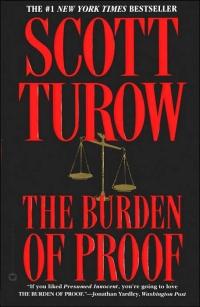 THE TRADWIFE'S SECRET |
 Sunshine, secrets, and swoon-worthy stories—June's featured reads are your perfect summer escape. |

Purchase
Warner Mystery Legal, Thriller Legal Excerpt of Burden of Proof by Scott TurowThey had been married for thirty-one years, and the following spring, full of resolve and a measure of hope, he would marry again. But that day, on a late afternoon near the end of March, Mr. Alejandro Stern had returned home and, with his attaché case and garment bag still in hand, called out somewhat absently from the front entry for Clara, his wife. He was fifty-six years old, stout and bald, and never particularly good-looking, and he found himself in a mood of intense preoccupation. For two days he had been in Chicago -- that city of rough souls -- on behalf of his most difficult client. Dixon Hartnell was callous, self-centered, and generally scornful of his lawyers' ad- vice; worst of all, representing him was a permanent engagement. Dixon was Stern's brother-in-law, married to Silvia, his sister, Stern's sole living immediate relation and the enduring object of his affections. For Dixon, of course, his feelings were hardly as pure. In the early years, when Stem's practice amounted to little more than the decorous hustling of clients in the hallways of the misdemeanor courts, serving Dixon's unpredictable needs had paid Stern's rent. Now it was one of those imponderable duties, darkly rooted in the hard soil of Stem's own sense of filial and professional obligation. It was also steady work. The proprietor of a vast commodity-futures trading empire, a brokerage house he had named, in youth, Maison Dixon, and a series of interlocked subsidiaries, all called MD-this and -that, Dixon was routinely in trouble. Exchange officials, federal regulators, the IRS -- they'd all had Dixon's number for years. Stern stood up for him in these scrapes. But the present order of business was of greater concern. A federal grand jury sitting here in Kindle County had been issuing subpoenas out of town to select MD clients. Word of these subpoenas, served by the usual grim-faced minions of the FBI, had been trailing back to MD for a week now, and Stern, at the conclusion of his most recent trial, had flown at once to Chicago to meet privately with the attorneys representing two of these customers and to review the records the government required from them. The lawyers reported that the Assistant United States Attorney assigned to the matter, a young woman named Klonsky, declined to say precisely who was under suspicion, beyond exonerating the customers themselves. But to a practiced eye, this all had an ominous look. The out-of-town subpoenas reflected a contemplated effort at secrecy. The investigators knew what they were seeking and seemed intent on quietly encircling Dixon, or his companies, or someone close to him. So Stern stood travel-weary and vexed in the slate foyer of the home where Clara and he had lived for nearly two decades. And yet, what was it that wrested his attention so thoroughly, so suddenly? The silence, he would always say. Not a tap running, a radio mumbling, not one of the household machines in operation. An isolated man, he drew, always, a certain comfort from stillness. But this was not the silence of rest or interruption. He left his bags on the black tiles and stepped smartly through the foyer. "Clara?" he called again. He found her in the garage. When he opened the door, the odor of putrefaction overwhelmed him, a powerful high sour smell which dizzied him with the first breath and drove up sick- ness like a fist. The car, a black Seville, the current model, had been backed in; the driver's door was open. The auto's white dome light remained on, so that in the dark garage she was wanly spotlit. From the doorway he could see her leg extended toward the concrete floor, and the hem of a bright floral shirtwaist dress. He could tell from the glint that she was wearing hosiery. Slowly, he stepped down. The heat in the garage and the smell which increased revoltingly with each step were overpowering, and in the dark his fear left him weak. When he could see her through the open door of the car, he advanced no farther. She was reclined on the camel-colored leather of the front seat. Her skin, which he noticed first, was burnished with an unnatural peachish glow, and her eyes were closed. It seemed she had meant to appear neat and composed. Her left hand, faultlessly manicured, was placed almost ceremonially across her abdomen, and the flesh had swollen slightly beneath her wedding rings. She had brought nothing with her. No jacket. No purse. And she had not fallen back completely; her other arm was rigidly extended toward the wheel, and her head was pinned against the seat at a hopeless, impossible angle. Her mouth was open, her tongue extruded, her face dead, motionless, absolutely still. In the whitewashed laundry room adjoining the garage he was immediately sick in one of the porcelain basins, and he washed away all traces before calling in quick order 911 and then his son. "You must come straightaway," he said to Peter. He had found him' at home. "Straightaway." As usual in stress, lie heard some faint accentuation of the persistent Hispanic traces in his speech; the accent was always there, an enduring deficit as he thought of it, like a limp. "Something is wrong with Mother," Peter said. Stern had mentioned nothing like that, but his son's feeling for these things was sure. "What happened in Chicago?" When Stern answered that she had not been with him, Peter, true to his first instincts, began to quarrel. "How could she not be with you? I spoke to her the morning you were leaving." A shot of terrible sympathy for himself tore through Stern. He was lost, the emotional pathways hopelessly tangled. Hours later, toward morning, as he was sitting alone beneath a single light, sipping sherry as he revisited, reparsed every solemn moment of the day, he would take in the full significance of Peter's remark. But that eluded him now. He felt only, as ever, a deep central impatience with his son, a suffering, suppressed volcanic force, while somewhere else his heart read the first clues in what Peter had told him, and a sickening unspeakable chasm of regret began to open. "You must come now, Peter. I have no idea precisely what has occurred. I believe, Peter, that your mother is dead." His son, a man of thirty, let forth a brief high sound, a cry full of desolation. "You believe it?" "Please, Peter. I require your assistance. This is a terrible moment. Come ahead. You may interrogate me later." "For Chrissake, what in the hell is happening there? What in the hell is this? Where are you?" "I am home, Peter. I cannot answer your questions now. Please do as I ask. I cannot attend to this alone." He hung up the phone abruptly. His hands were trembling and he leaned once more against the laundry basin. He had seemed so coldly composed only an instant before. Now some terrible sore element in him was on the rise. He presumed he was about to faint. He removed his tie first, then his jacket. He returned for an instant to the garage door; but he could not push it open. If he waited, just a moment, it seemed he would understand. The house was soon full of people he did not know. The police came first, in pairs, parking their cars at haphazard angles in the drive, then the paramedics and the ambulance. Through the windows Stem saw a gaggle of his neighbors gathering on the lawn across the way. They leaned toward the house with the arrival of each vehicle and spoke among themselves, held behind the line of squad cars with their revolving beacons. Within the house, policemen roamed about with their usual regrettable arrogance. Their walkie-talkies blared with occasional eruptions of harsh static. They went in and out of the garage to gawk at the body and talked about events as if he were not there. They studied the Sterns' rich possessions with an envy that was disconcertingly apparent. The first cop into the garage had lifted his radio to summon the lieutenant as soon as he emerged. "She's cooked," the officer told the dispatcher. "Tell him he better come with masks and gloves." Only then did he notice Stem lurking in a fashion in the dark hall outside the laundry room. Abashed, the policeman began at once to explain. "Looks like that car run all clay. It's on empty now. Catalytic converter gets hotter than a barbecue six, seven hundred degrees. You run that engine twelve hours in a closed space, you're generating real heat. That didn't do her any good. You the husband?" He was, said Stem. "Condolences," said the cop. "Terrible thing." They waited. "Do you have any idea, Officer, what occurred?" He did not know what he thought just now, except that it would be a kind of treachery to believe the worst too soon. The cop considered Stern in silence. He was ruddy and thick, and his weight probably made him look older than he was. "Keys in the ignition. On position. Garage door's closed." Stern nodded. "It dudn't look like any accident to me," the cop said finally. "You can't be sure till the autopsy. You know, could be she had a heart attack or somethin right when she turned the key. "Maybe it's one of them freak things, too," the cop said. "Turns the car on and she's thinkin about somethin else, you know, fixin her hair and makeup, whatever. Sometimes you never know. Didn't find a note, right?" A note. Stern had spent the moments awaiting the various authorities here in this hallway, keeping his stupefied watch beside the door. The thought of a note, some communication, provided, against all reason, a surge of hope. "You'd just as well stay out of there," the policeman said, gesturing vaguely behind him. Stern nodded with the instruction, but after an instant he took a single step forward. "Once more," he said. The policeman waited only a moment before opening the door. Excerpt from Burden of Proof by Scott Turow |
|
| |||
|
||||



 © 2003-2025
© 2003-2025